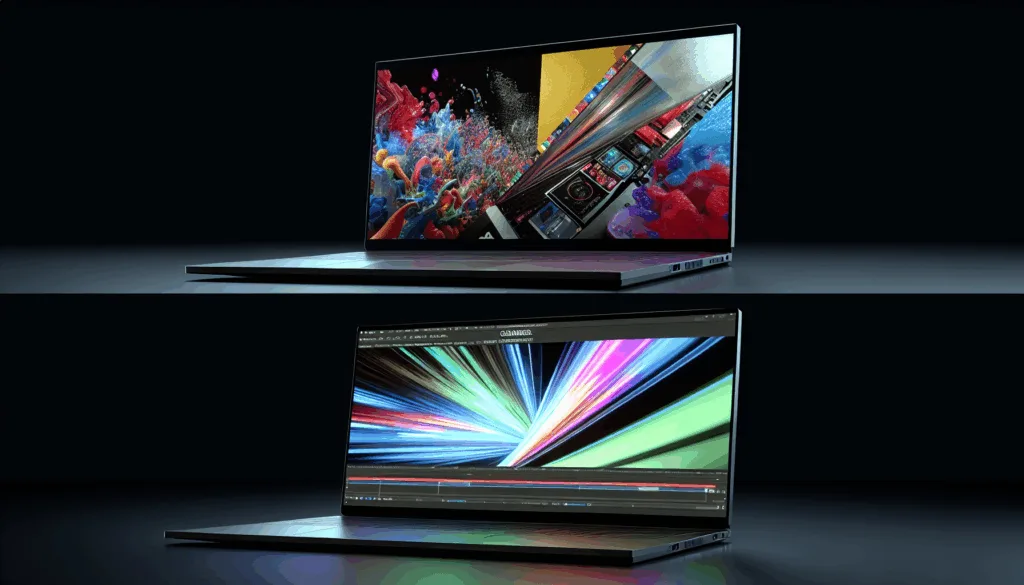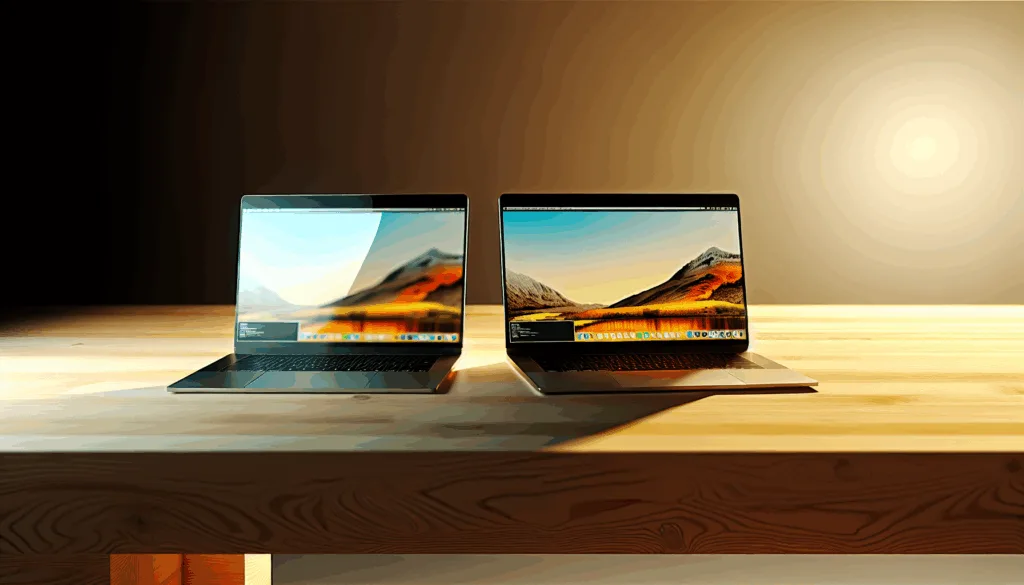MacBook Air M3 vs Dell XPS 13 (2025): Which One Should You Choose?
In the ever-evolving world of technology, choosing the right laptop can be a daunting task, especially when faced with two titans like the MacBook Air M3 and the Dell XPS 13 (2025). Both models have garnered significant attention, each boasting unique features and capabilities. This article dives deep into the specifics of these two laptops, guiding you to make an informed decision that aligns with your needs and preferences.
Design and Build Quality
When it comes to design, both the MacBook Air M3 and the Dell XPS 13 (2025) are at the forefront of modern aesthetics. The MacBook Air M3 continues Apple’s tradition of sleek, minimalist design. With its unibody aluminum chassis, the MacBook Air feels both sturdy and lightweight, making it ideal for on-the-go professionals. The M3 model introduces subtle refinements, such as thinner bezels and a slightly more compact form factor, enhancing its portability without sacrificing screen real estate.
On the other hand, the Dell XPS 13 (2025) is no slouch in the design department. Known for its InfinityEdge display, the XPS 13 maximizes screen space by minimizing bezels, offering an immersive viewing experience. The latest model features a carbon fiber and aluminum build, providing a perfect balance of durability and elegance. Dell has also improved the hinge mechanism, ensuring smoother opening and closing, which adds to the premium feel of the device.
Both laptops offer excellent build quality, but your choice may boil down to personal preference. If you prioritize a lightweight, minimalist design, the MacBook Air M3 might be your go-to. However, if you appreciate cutting-edge display technology and a slightly more robust build, the Dell XPS 13 (2025) could be more appealing.
Performance and Specifications
Performance is a critical factor when choosing a laptop, and both the MacBook Air M3 and Dell XPS 13 (2025) deliver impressive power under the hood. The MacBook Air M3 is equipped with Apple’s latest M3 chip, which promises significant improvements in processing power and energy efficiency. This ARM-based chip is designed to handle demanding tasks with ease, from video editing to software development, while maintaining excellent battery life.
The Dell XPS 13 (2025), meanwhile, offers a range of Intel’s latest processors, including options for i5 and i7 configurations. Paired with up to 32GB of RAM, the XPS 13 ensures seamless multitasking and robust performance for various applications. Dell has also enhanced the thermal design to keep the laptop cool under pressure, which is a notable improvement over previous models.
Here’s a quick comparison of key specifications:
| Specification | MacBook Air M3 | Dell XPS 13 (2025) |
|---|---|---|
| Processor | Apple M3 Chip | Intel i5/i7 |
| RAM | Up to 16GB | Up to 32GB |
| Storage | Up to 2TB SSD | Up to 2TB SSD |
| Display | Retina, 2560 x 1600 | FHD+/4K, 1920 x 1200 |
| Battery Life | Up to 18 hours | Up to 14 hours |
While both laptops offer impressive performance, your choice might depend on your specific use case. The MacBook Air M3 excels in energy efficiency and integration with macOS, while the Dell XPS 13 provides more flexibility in configuration options and compatibility with Windows applications.
Display and Audio Quality
The display is where both laptops truly shine, each offering a unique visual experience. The MacBook Air M3 features a stunning Retina display, known for its vibrant colors and sharp details. With a resolution of 2560 x 1600, it provides an excellent canvas for creative work and media consumption. The True Tone technology adjusts the display’s color temperature based on ambient lighting, ensuring a comfortable viewing experience in any environment.
Conversely, the Dell XPS 13 (2025) offers a choice between FHD+ and 4K displays. The 4K option, in particular, is a treat for the eyes, delivering unparalleled clarity and detail. The anti-reflective coating and 500-nit brightness make it suitable for outdoor use, a feature that frequent travelers will appreciate. The XPS 13 also supports Dolby Vision, enhancing the dynamic range and color accuracy for movies and games.
Audio quality is another area where both laptops excel. The MacBook Air M3 features stereo speakers with wide stereo sound, providing clear and immersive audio. The integration with macOS ensures optimal sound quality for music and video playback. The Dell XPS 13, equipped with Waves MaxxAudio Pro, offers rich and balanced sound, making it a great choice for multimedia enthusiasts.

Battery Life and Portability
Battery life is often a decisive factor for those who need a laptop that can last through a full day of work or travel. The MacBook Air M3 excels in this department, offering up to 18 hours of battery life on a single charge. This impressive longevity is largely due to the efficiency of the M3 chip, making it an ideal choice for users who need a reliable companion for extended periods away from a power source.
The Dell XPS 13 (2025), while slightly behind in battery life, still offers a respectable 14 hours of usage. This is more than sufficient for most daily activities and ensures that you won’t be left searching for an outlet during a typical workday. Dell’s fast charging technology also means you can quickly top up the battery when needed, a feature that busy professionals will find invaluable.
Portability is another strength of both laptops. The MacBook Air M3, with its lightweight design, is easy to carry around, fitting comfortably into most bags without adding much weight. Similarly, the Dell XPS 13’s compact form factor makes it a breeze to transport, whether you’re commuting or traveling internationally. Both laptops offer the portability and convenience that modern users demand.
Operating System and Software Ecosystem
The choice between macOS and Windows is often a personal one, influenced by past experiences and specific software requirements. The MacBook Air M3 runs on macOS Ventura, offering a seamless and intuitive user experience. Apple’s ecosystem is known for its integration, with features like Handoff and Continuity allowing for smooth transitions between devices. The App Store provides a curated selection of applications, ensuring quality and security.
On the other hand, the Dell XPS 13 (2025) runs on Windows 11, offering a more customizable and flexible environment. Windows users benefit from a vast library of software, catering to a wide range of professional and personal needs. The integration with Microsoft’s suite of productivity tools, such as Office 365, is a significant advantage for business users. Windows 11 also introduces a refreshed interface and enhanced gaming capabilities, appealing to a broader audience.
Ultimately, the decision between macOS and Windows may come down to your specific workflow and software preferences. If you are deeply embedded in Apple’s ecosystem or prefer the simplicity of macOS, the MacBook Air M3 is a natural choice. Conversely, if you require the versatility and compatibility of Windows, the Dell XPS 13 (2025) is a compelling option.

Price and Value
Price is often a key consideration when purchasing a laptop, and both the MacBook Air M3 and Dell XPS 13 (2025) are positioned in the premium segment. The MacBook Air M3 starts at a competitive price point, offering excellent value given its performance, build quality, and integration with Apple’s ecosystem. Additional configurations with more storage and RAM are available, allowing users to tailor the device to their needs.
The Dell XPS 13 (2025) is similarly priced, with a range of configurations to suit different budgets and requirements. While the base model offers solid performance, upgrading to higher-end components such as the 4K display or additional RAM can increase the cost significantly. However, the flexibility in configuration options allows users to find a balance between performance and price that suits their specific needs.
In terms of value, both laptops offer a compelling package. The MacBook Air M3 provides exceptional longevity and seamless integration for Apple users, while the Dell XPS 13 (2025) offers versatility and cutting-edge technology for Windows enthusiasts. Ultimately, the best value will depend on your personal preferences and how you intend to use the laptop.
Conclusion
Choosing between the MacBook Air M3 and the Dell XPS 13 (2025) is no easy task, as both laptops offer outstanding features and performance. The MacBook Air M3 is ideal for those who value a sleek design, excellent battery life, and seamless integration with Apple’s ecosystem. It’s a perfect choice for creatives, students, and professionals who are already embedded in the Apple universe.
Conversely, the Dell XPS 13 (2025) stands out with its stunning display options, robust build quality, and the flexibility of Windows 11. It’s well-suited for users who need a versatile machine that can handle a variety of tasks, from productivity to entertainment.
In the end, your decision should be guided by your specific needs, preferences, and budget. Whichever you choose, both the MacBook Air M3 and Dell XPS 13 (2025) are excellent investments in the realm of premium laptops, offering a blend of performance, design, and innovation that will serve you well for years to come.

